Ze'ev Jabotinsky
Ze'ev Jabotinsky, MBE (/ˌ(d)ʒæbəˈtɪnski, ˌ(d)ʒɑːbə-/;[4][5] Hebrew: זְאֵב זַ׳בּוֹטִינְסְקִי, Ze'ev Zhabotinski; Yiddish: וואלף זשאַבאָטינסקי, Wolf Zhabotinski; born Vladimir Yevgenyevich Zhabotinsky, Russian: Влади́мир Евге́ньевич Жаботи́нский; 5 (17) October 1880,[1] Odessa – 3 August 1940,[6] Hunter, New York), was a Russian Jewish Revisionist Zionist leader, author, poet, orator, soldier and founder of the Jewish Self-Defense Organization in Odessa. With Joseph Trumpeldor, he co-founded the Jewish Legion[7] of the British army in World War I. Later he established several Jewish organizations in Palestine, including Betar, Hatzohar, and the Irgun.
Ze'ev Jabotinsky | |
|---|---|
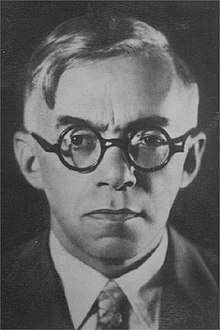 Jabotinsky in 1935 | |
| Born | Vladimir Yevgenyevich Zhabotinsky 17 October 1880[1] |
| Died | 3 August 1940 (aged 59)[3] |
| Resting place | 1940–1964: New Montefiore Cemetery, New York, United States 1964–present: Mt. Herzl, Jerusalem, Israel 31°46′26″N 35°10′50″E |
| Nationality | Russia |
| Education | Law |
| Alma mater | Sapienza University of Rome |
| Occupation | Journalist, writer, military leader and political activist |
| Known for | Creating Jewish (and later, Israeli) right-wing secular politics; head of Betar |
| Political party | Hatzohar |
| Spouse(s) | Hanna Markovna Halpern ( m. 1907–1940) |
| Awards | Member of the Order of the British Empire (1919) |
His influence on Israeli politics is profound: through his closest protégé Menachem Begin's administration (1977–1983), consolidating the domination of Israeli politics by the right-wing Likud party; and through the administrations (1996–1999, 2009–) of Likud's leader (1993–1999, 2005–) Benjamin Netanyahu, the son of his former personal secretary and historian, Benzion Netanyahu.
Biography
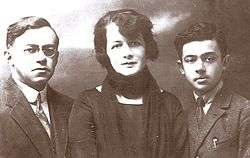
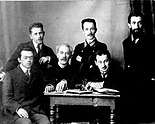
Vladimir Yevgenyevich (Yevnovich) Zhabotinsky[8] was born in Odessa,[2] Kherson Governorate (modern Ukraine) into an assimilated Jewish family.[9] His father, Yevno (Yevgeniy Grigoryevich) Zhabotinsky, hailed from Nikopol, Yekaterinoslav Governorate. He was a member of the Russian Society of Sailing and Trade and was primarily involved in wheat trading. His mother, Chava (Eva Markovna) Zach (1835–1926), came from Berdychiv, Kiev Governorate. Jabotinsky's older brother Myron died when Vladimir was six months old, and his father died when he was six years old. His sister, Tereza (Tamara Yevgenyevna) Zhabotinskaya-Kopp, founded a private school for girls in Odessa. In 1885, the family moved to Germany due to his father's illness, returning a year later after his father's death.
Raised in a middle-class Jewish home, Jabotinsky was educated in Russian schools. Although he studied Hebrew as a child, he wrote in his autobiography that his upbringing was divorced from Jewish faith and tradition. His mother ran a stationery store in Odessa. Jabotinsky dropped out of school at the age of 17 with a guarantee of a job as a correspondent for a local Odessan newspaper,[10] the Odesskiy Listok, and was sent to Bern and Rome as a correspondent. He also worked for the Odesskie Novosti after his return from Italy.[11] Jabotinsky was a childhood friend of Russian journalist and poet Korney Chukovsky.[12]
Jabotinsky was a student at the Sapienza University of Rome law school, but did not graduate. In addition to Russian, Yiddish and Hebrew, he spoke fluent Italian.[13]
In April 1902 he was arrested for writing feuilletons in an anti-establishment tone, as well as contributing to a radical Italian journal. He was held isolated in a prison cell in Odessa for two months, where he communicated with other inmates through shouting and passing written notes.[14]
He married Joanna (or Ania) Galperina in October 1907.[15] They had one child, Eri Jabotinsky, who later became a member of the Irgun-affiliated Bergson Group. Eri Jabotinsky briefly served in the 1st Knesset of Israel; he died on 6 June 1969.[16]
Zionist activism in Russia
Prior to the Kishinev pogrom of 1903, Jabotinsky joined the Zionist movement, where he soon became known as a powerful speaker and an influential leader.[17] With more pogroms looming on the horizon, he established the Jewish Self-Defense Organization, a Jewish militant group, to safeguard Jewish communities throughout Russia. He became the source of great controversy in the Russian Jewish community as a result of these actions.
Around this time, he began learning modern Hebrew, and took a Hebrew name: Vladimir became Ze'ev ("wolf"). During the pogroms, he organized self-defence units in Jewish communities across Russia and fought for the civil rights of the Jewish population as a whole. His slogan was, "Better to have a gun and not need it than to need it and not have it!" Another slogan was, "Jewish youth, learn to shoot!"
In 1903, he was elected as a Russian delegate to the Sixth Zionist Congress in Basel, Switzerland. After Theodore Herzl's death in 1904, he became the leader of the right-wing Zionists. That year he moved to Saint Petersburg and became one of the co-editors for the Russophone magazine Yevreiskaya Zhyzn (Jewish Life), which after 1907 became the official publishing body of the Zionist movement in Russia. In the pages of the newspaper, Jabotinsky wrote fierce polemics against supporters of assimilation and the Bund.
In 1905, he was one of the co-founders of the "Union for Rights Equality of Jewish People in Russia". The following year, he was one of the chief speakers at the 3rd All-Russian Conference of Zionists in Helsinki (Helsingfors), which called upon the Jews of Europe to engage in Gegenwartsarbeit (work in the present) and to join together to demand autonomy for ethnic minorities in Russia.[18] This liberal approach was later apparent in his position concerning the Arab citizens of the future Jewish State: Jabotinsky asserted that "Each one of the ethnic communities will be recognized as autonomous and equal in the eyes of the law."[18]
In 1909, he fiercely criticized leading members of the Russian Jewish community for participating in ceremonies marking the centennial of the Russian writer Nikolai Gogol. In the light of Gogol's anti-Semitic views, Jabotinsky claimed it was unseemly for Russian Jews to take part in these ceremonies, as it showed they had no Jewish self-respect.[19]
WZO representative in Turkey, 1908–1914
In 1908, the Berlin Executive office of the World Zionist Organisation (WZO), sent Jabotinsky to the Ottoman capital Constantinople. Jabotinsky became editor-in-chief of a new pro-Young-Turkish daily newspaper Jeune Turc, which was founded and financed by Zionist officials like WZO president David Wolffsohn and his representative in Constantinople Victor Jacobson. The journalists writing for that paper included the famous German Social democrat and Russian-Jewish revolutionary Parvus, who lived in Constantinople from 1910 until 1914. The Jeune Turc was prohibited in 1915 by the pro-German Turkish military junta. Richard Lichtheim, who was to become Jabotinsky's representative in Germany in 1925, stayed in Constantinople as WZO representative and managed to keep the "Yishuv" out of trouble during the war years by constant diplomatic interventions with Germans, Turks, and also US authorities, whose humanitarian support was crucial for the survival of the Jewish settlement project in Palestine during the war years.[20]
Military career
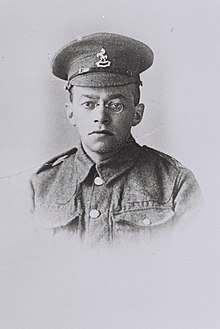
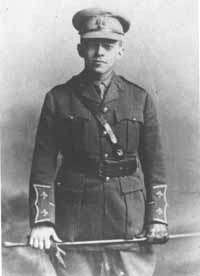
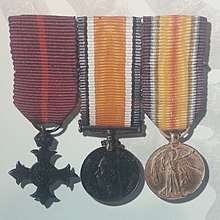
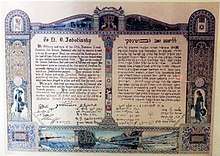
During World War I, he had the idea of establishing a Jewish Legion to fight alongside the British against the Ottomans who then controlled Palestine. In 1915, together with Joseph Trumpeldor, a one-armed veteran of the Russo-Japanese War, he created the Zion Mule Corps, which consisted of several hundred Jewish men, mainly Russians who had been exiled from Palestine by the Ottoman Empire and had settled in Egypt. The unit served with distinction in the Battle of Gallipoli. When the Zion Mule Corps was disbanded, Jabotinsky traveled to London, where he continued his efforts to establish Jewish units to fight in Palestine as part of the British Army. Although Jabotinsky did not serve with the Zion Mule Corps, Trumpeldor, Jabotinsky and 120 Zion Mule Corps members did serve in Platoon 16 of the 20th Battalion of the London Regiment. In 1917, the government agreed to establish three Jewish battalions, initiating the Jewish Legion.
As an honorary lieutenant in the 38th Royal Fusiliers, Jabotinsky saw action in Palestine in 1918.[21] His battalion was one of the first to enter Transjordan.[21]
He was demobilised in September 1919,[22] soon after he complained to Field Marshal Allenby about the British Army's attitude towards Zionism and the Jewish Legion.[23] His appeals to the British government failed to reverse the decision, but in December 1919[24] he was appointed a Member of the Order of the British Empire (MBE) for his service.[25]
Jewish self-defense in Palestine
After Ze'ev Jabotinsky was discharged from the British Army in September 1919, he openly trained Jews in warfare and the use of small arms. On 6 April 1920, during the 1920 Palestine riots the British searched the offices and apartments of the Zionist leadership for arms, including the home of Chaim Weizmann, and in a building used by Jabotinsky's defense forces they found three rifles, two pistols, and 250 rounds of ammunition.
Nineteen men were arrested. The next day Jabotinsky protested to the police that he was their commander and therefore solely responsible, so they, should be released. Instead, he was arrested and joined them in jail, the nineteen were sentenced to three years in prison and Jabotinsky was given a 15-year prison term for possession of weapons, until the month of July when a general pardon was granted to Jews and Arabs convicted in the rioting.[26]
A committee of inquiry placed responsibility for the riots on the Zionist Commission, alleging that they provoked the Arabs. The court blamed "Bolshevism" claiming that it "flowed in Zionism's inner heart", and ironically identified the fiercely anti-socialist Jabotinsky with the socialist-aligned Poalei Zion ('Zionist Workers') party, which it called 'a definite Bolshevist institution.'[27]
Founder of the Revisionist movement
.jpg)
In 1920, Jabotinsky was elected to the first Assembly of Representatives in Palestine. The following year he was elected to the executive council of the Zionist Organization. He was also a founder of the newly registered Keren haYesod and served as its director of propaganda.[28] Jabotinsky left the mainstream Zionist movement in 1923 due to differences of opinion between him and its chairman, Chaim Weizmann, establishing a new revisionist party called Alliance of Revisionists-Zionists and its youth movement, Betar (a Hebrew acronym for the "League of Joseph Trumpeldor").
His new party demanded that the mainstream Zionist movement recognize as its stated objective the establishment of a Jewish state on both banks of the Jordan River. His main goal was to establish a modern Jewish state with the help of the British Empire. His philosophy contrasted with that of the socialist oriented Labor Zionists, in that it focused its economic and social policy on the ideals of the Jewish middle class in Europe. His ideal for a Jewish state was a form of nation state based loosely on the British imperial model.[29] His support base was mostly located in Poland, and his activities focused on attaining British support to help with the development of the Yishuv. Another area of major support for Jabotinsky was Latvia, where his speeches in Russian made an impression on the largely Russian-speaking Latvian Jewish community.
Jabotinsky was both a nationalist and a liberal democrat. Despite his attachment to nationalism, he did not embrace authoritarian notions of state authority and its imposition on individual liberty; he said that "Every man is a king." He championed the notion of a free press and believed the new Jewish state would protect the rights and interests of minorities. As an economic liberal, he supported a free market with minimal government intervention, but also believed that the "'elementary necessities' of the average person...: food, shelter, clothing, the opportunity to educate his children, and medical aid in case of illness" should be supplied by the state.[30]
Literary career
In 1898, Jabotinsky was sent to Rome as a correspondent for Odessky Listok, writing columns under the pen name "V. Egal, "Vl. Egal" "V.E." for more than a year. His first application for a job at Odesskiya Novosti was turned down, but after the editor, J.M. Heifetz, saw his writing for Odessky Listok, he hired him. At that point, Jabotinsky changed his pen name to Altalena, which he confesses was a mistake. He thought the Italian word meant "elevator," but explained to the editor that the real meaning, "swing," suited him well, since he was "'by no means stable or constant', but rather rocking and balancing."[31]
In 1914, Jabotinsky published the first Hebrew translation of Edgar Allan Poe's poems The Raven and Annabel Lee.[32]
From 1923, Jabotinsky was editor of the revived Jewish weekly Rassvet (Dawn), published first in Berlin, then in Paris. Besides his journalistic work, he published novels under his previous pseudonym Altalena; his historical novel Samson Nazorei (Samson the Nazirite, 1927), set in Biblical times, describes Jabotinsky's ideal of an active, daring, warrior form of Jewish life. His novel Pyatero (The Five, written 1935, published 1936) has been described as "a work that probably has the truest claim to being the great Odessa novel. ... It contains poetic descriptions of early-twentieth-century Odessa, with nostalgia-tinged portraits of its streets and smells, its characters and passions."[33] Although it was little noticed at the time, it has received renewed appreciation for its literary qualities at the start of the twenty-first century, being reprinted in Russia and Ukraine and in 2005 translated into English (the first translation into a Western language).[34]
Return to Palestine blocked by the British
In 1930, while he was visiting South Africa, he was informed by the British Colonial Office that he would not be allowed to return to Palestine.[35]
Evacuation plan for the Jews of Poland, Hungary and Romania
_MEETING_WITH_BETAR_LEADERS_IN_WARSAW._BOTTOM_LEFT_MENAHEM_BEGIN._%D7%96%D7%90%D7%91_%D7%96'%D7%91%D7%95%D7%98%D7%99%D7%A0%D7%A1%D7%A7%D7%99_%D7%A0%D7%A4%D7%92%D7%A9_%D7%A2%D7%9D_%D7%9E%D7%A0%D7%94%D7%99%D7%92%D7%99_%D7%91%D7%99%D7%AA%22%D7%A8_%D7%91%D7%95%D7%A8%D7%A9%D7%94%2C_%D7%A4%D7%95%D7%9C%D7%99%D7%9F._%D7%9E%D7%A9%D7%9E%D7%90%D7%9C_%D7%9C%D7%9ED705-081.jpg)
During the 1930s, Jabotinsky was deeply concerned with the situation of the Jewish community in Eastern Europe. In 1936, Jabotinsky prepared the so-called "evacuation plan", which called for the evacuation of 1.5 million Jews from Poland, Baltic States, Third Reich, Hungary and Romania to Palestine over the span of next ten years.The plan was first proposed on 8 September 1936 in the conservative Polish newspaper Czas, the day after Jabotinsky organized a conference where more details of the plan were laid out; the emigration would take 10 years and would include 750,000 Jews from Poland, with 75,000 between age of 20-39 leaving the country each year. Jabotinsky stated that his goal was to reduce Jewish population in the countries involved to levels that would make them disinterested in its further reduction[36]
The same year he toured Eastern Europe, meeting with the Polish Foreign Minister, Colonel Józef Beck; the Regent of Hungary, Admiral Miklós Horthy; and Prime Minister Gheorghe Tătărescu of Romania to discuss the evacuation plan. The plan gained the approval of all three governments, but caused considerable controversy within the Jewish community of Poland, on the grounds that it played into the hands of anti-Semites. In particular, the fact that the 'evacuation plan' had the approval of the Polish government was taken by many Polish Jews as indicating Jabotinsky had gained the endorsement of what they considered to be the wrong people.
The evacuation of Jewish communities in Poland, Hungary and Romania was to take place over a ten-year period. However, the British government vetoed it, and the World Zionist Organization's chairman, Chaim Weizmann, dismissed it. Chaim Weizmann suggested that Jabotinsky was willing to accept Madagascar as one destination for limited emigration for Jews, due to political issues involved with settlement in Palestine, and dispatches from Warsaw by British ambassador Hugh Kennard, corroborate Weizmann's account[37][38] Two years later, in 1938, Jabotinsky stated in a speech that Polish Jews were "living on the edge of the volcano", and warned that a wave of pogroms would happen in Poland sometime in the near future. "Catastrophe is approaching. ... I see a terrible picture ... the volcano that will soon spew out its flames of extermination," he said.[39] Jabotinsky went on to warn Jews in Europe that they should leave for Palestine as soon as possible.[40] There is much discussion about whether or not Jabotinsky actually predicted the Holocaust. In his writings and public appearances he warned against the dangers of an outbreak of violence against the Jewish population of Central and Eastern Europe. However, as late as August 1939, he was certain that war would be averted.[41]
Plan for a revolt against the British
In 1939, Britain enacted the MacDonald White Paper, in which Jewish immigration to Palestine under the British Mandate was to be restricted to 75,000 for the next five years, after which further Jewish immigration would depend on Arab consent. In addition, land sales to Jews were to be restricted, and Palestine would be cultivated for independence as a binational state.
Jabotinsky reacted by proposing a plan for an armed Jewish revolt in Palestine. He sent the plan to the Irgun High Command in six coded letters. Jabotinsky proposed that he and other "illegals" would arrive by boat in the heart of Palestine – preferably Tel Aviv – in October 1939. The Irgun would ensure that they successfully landed and escaped, by whatever means necessary. They would then occupy key centers of British power in Palestine, chief among them Government House in Jerusalem, raise the Jewish national flag, and fend off the British for at least 24 hours whatever the cost. Zionist leaders in Western Europe and the United States would then declare an independent Jewish state, and would function as a provisional government-in-exile. Although Irgun commanders were impressed by the plan, they were concerned over the heavy losses they would doubtless incur in carrying it out. Avraham Stern proposed simultaneously landing 40,000 armed young immigrants in Palestine to help launch the uprising. The Polish government supported his plan, and it began training Irgun members and supplying them arms. Irgun submitted the plan for the approval of its commander David Raziel, who was imprisoned by the British. However, the beginning of World War II in September 1939 quickly put an end to these plans.[42][43]
Integrated state with Arabs
According to the historian Benny Morris, documents show that Jabotinsky favored the idea of the transfer of Arab populations if required for establishing a (still-proposed) Jewish state.[44] Jabotinsky's other writings state, "We do not want to eject even one Arab from either the left or the right bank of the Jordan River. We want them to prosper both economically and culturally. We envision the regime of Jewish Palestine [Eretz Israel ha-Ivri] as follows: most of the population will be Jewish, but equal rights for all Arab citizens will not only be guaranteed, they will also be fulfilled."[30] Jabotinsky was convinced that there was no way for the Jews to regain any part of Palestine without opposition from the Arabs. In 1934, he wrote a draft constitution for the Jewish state which declared that Arabs would be on an equal footing with their Jewish counterparts "throughout all sectors of the country's public life." The two communities would share the state's duties, both military and civil service, and enjoy its prerogatives. Jabotinsky proposed that Hebrew and Arabic should enjoy equal status, and that "in every cabinet where the prime minister is a Jew, the vice-premiership shall be offered to an Arab and vice versa."[45]
Death
On May 12, 1940, Jabotinsky offered Winston Churchill the support of a Jewish Army; he also proposed Weizman and Ben-Gurion the creation of a United Front for policy and relief.[46] In his visit to New York in order to build support within the United States for a Jewish Army to fight the Nazis,[47] Jabotinsky died of a heart attack on 3 August 1940, 22:45,[48][49] Saturday night,[50][51][52][53][54] while he was visiting a Jewish self-defense camp in Hunter, New York that was run by Betar.[55] Most of the books say that Jabotinsky died on 4 August, because a wrong conversion from the Hebrew day (that starts after sunset and not after midnignt). The correct date is 3 August, the telegram of the Jewish Telegraphic Agency from 4 August says he died "shortly before midnight last night".[56] He was buried in New Montefiore Cemetery in Farmingdale, New York,[57] in accordance with a clause of his will. A monument to Jabotinsky was erected at his original burial site in New York.[58] In 1964 the remains of Jabotinsky and his wife, in accordance with a second clause of his will, were reburied in Mount Herzl Cemetery in Jerusalem by order of Israeli Prime Minister Levi Eshkol.[59]
Legacy and honors
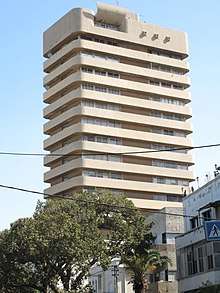
- Ze'ev Jabotinsky's legacy was carried on by Israel's Herut party, which merged with other right-wing parties to form the Likud Party in 1973. Likud has since acted as Israel's main right-wing party, and has been part of most Israeli governments since 1977. His legacy has also been honored to a smaller extent by Herut – The National Movement (a breakaway from Likud), Magshimey Herut (young adult activist movement) and Betar (youth movement). In the United States, his call for Jewish self-defense has led to the formation of Americans for a Safe Israel and the Jewish Defense Organization. The JDO's training camp is named Camp Jabotinsky.
- In Israel, 57 streets, parks and squares are named after Jabotinsky, more than for any other person in Jewish or Israeli history. making him the most-commemorated historical figure in Israel.[60]
- The Jabotinsky Medal is awarded for outstanding achievements in the sphere of literature and research.
- The Jabotinsky Institute, in Tel Aviv, is a repository of documents and research relating to the history of Betar, the Revisionist movement, the Irgun, and Herut.[61] It is identified with Likud.[62]
- A bronze bust of Jabotinsky by Johan Oldert was presented to the Metzudat Ze'ev in Tel Aviv in 2008 and remains on display.[63]
- Jabotinsky Day (Hebrew: יום ז'בוטינסקי) is an Israeli national holiday celebrated annually on the twenty ninth of the Hebrew month of Tammuz, to commemorate the life and vision of Zionist leader Ze'ev Jabotinsky.[64]
- In the 1990s, the Sweden-based church Livets ord set up an organisation called Operation Jabotinsky with the purpose of assisting diaspora Jews, mainly from the former Soviet Union, in emigrating to Israel.
Published works
- Turkey and the War, London, T.F. Unwin, Ltd. [1917]
- Samson the Nazarite, London, M. Secker, [1930]
- The Jewish War Front, London, T.F. Unwin, Ltd. [1940]
- The War and The Jew, New York, The Dial Press [c1942]
- The Story of the Jewish Legion, New York, B. Ackerman, Inc. [c1945]
- The Battle for Jerusalem. Vladimir Jabotinsky, John Henry Patterson, Josiah Wedgwood, Pierre van Paassen explains why a Jewish army is indispensable for the survival of a Jewish nation and preservation of world civilization, American Friends of a Jewish Palestine, New York, The Friends, [1941]
- A Pocket Edition of Several Stories, Mostly Reactionary, Tel-Aviv: Reproduced by Jabotinsky Institute in Israel, [1984]. Reprint. Originally published: Paris, [1925]
- The Five, A Novel of Jewish Life in Turn-of-the-Century Odessa, Paris, [1936]
- Jabotinsky translated Edgar Allan Poe's "The Raven" into Hebrew and Russian, and parts of Dante's Divine Comedy into modern Hebrew verse.
- "The East Bank of the Jordan" (also known as "Two Banks has the Jordan"), a poem by Jabotinsky that became the slogan and one of the most famous songs of Betar
- Vladimir Jabotinsky's Story of My Life, Brian Horowitz & Leonid Katsis, eds., Detroit: Wayne State University Press, 2015.
References
- Владимир Евгеньевич Жаботинский. Russian Writers, 1800-1917. Biographical Dictionary, vol. 2, p. 250 // Русские писатели. 1800—1917. Биографический словарь. Т. 2: Г — К. — М.: Большая российская энциклопедия, 1992 (in Russian)
- Torossian, Ronn (19 May 2014). "Jabotinsky: A Life, by Hillel Halkin - Read and Wonder". Israel National News.
- "Ze'ev Jabotinsky". Encyclopaedia Britannica. Retrieved 11 August 2019.
- "Ze'ev Jabotinsky: A story of a Leader". Keren Hayesod. 24 September 2012. Retrieved 31 August 2019.
- "Yisrael Medad, Deputy Editor, English Anthology Volumes of Jabotinsky's Writings". ILTV Israel Daily. 25 December 2018. Retrieved 31 August 2019.
- Most of the books say that Jabotinsky died on 4 August, because they wrongly convert the date from the Hebrew calendar. See details below.
- Klinger, Jerry (October 2010). "The Struggle for the Jewish Legion and The Birth of the IDF". Jewish Magazine. Retrieved 5 December 2010.
- Nataliya and Yuri Kruglyak, KRT Web Studio at www.webservicestudio.com, Odessa, Ukraine (27 July 1939). "Archival documents on Zhabotinsky (Russian)". Odessitclub.org. Archived from the original on 29 September 2011. Retrieved 28 November 2011.CS1 maint: multiple names: authors list (link)
- "Heroes - Trailblazers of the Jewish People". Beit Hatfutsot.
- Halkin 2014, pp. 16–17.
- Halkin 2014, pp. 28–29.
- Valadmir Jabotinsky's Story of My Life
- Rebel and Statesman, The Early Years, Joseph B. Schechtman
- Halkin 2014, p. 33.
- Жаботинский З. Повесть моих дней. — Библиотека-Алия, 1985
- "Ari Jabotinsky". www.knesset.gov.il. Retrieved 2 August 2020.
- Kishinev 1903: The Birth of a Century, quoting from the memoirs of Simon Dubnow: "It was the night of April 7, 1903. Because of Russian Easter, the newspapers had not been issued for the previous two days so that we remained without any news from the rest of the world. That night the Jewish audience assembled in the Beseda Club, to listen to the talk of a young Zionist, the Odessa 'wunderkind' V. Jabotinsky [….] The young agitator had great success with his audience. In a particularly moving manner, he drew on Pinsker's parable of the Jew as a shadow wandering through space and developed it further. As for my own impression, this one-sided treatment of our historical problem depressed me: Did he not scarcely stop short of inducing fear in our unstable Jewish youth of their own national shadow?… During the break, while pacing up and down in the neighboring room, I noticed sudden unrest in the audience: the news spread that fugitives had arrived in Odessa from nearby Kishinev and had reported of a bloody pogrom in progress there."
- "Jabotinsky Ze'ev. Liberal and Zionist Leader. Brief Biography". Liberal.org.il. Archived from the original on 20 June 2009. Retrieved 22 September 2010.
- "Zeev (Vladimir) Jabotinsky - biography — JewAge". www.jewage.org. Retrieved 27 November 2017.
- For references, see Richard Lichtheims autobiographical books in Hebrew and German (see the Hebrew Wikipedia entry of Richard Lichtheim)
- Joseph Schechtman (1956). Rebel and Statesman; the Vladimir Jabotinsky Story. New York: Thomas Yoseloff. pp. 268–271.
- "No. 31619". The London Gazette. 24 October 1919. p. 13126.
- Schechtman (1956), pp. 279–282.
- "No. 31684". The London Gazette. 9 December 1919. p. 15455.
- Schechtman (1956), pp. 283–284.
- Zev Golan,Free Jerusalem, pp. 28–31
- Tom Segev, One Palestine, Complete, Metropolitan Books, 1999. p.141
- "Keren Hayesod". Archived from the original on 28 September 2007. Retrieved 10 December 2009.CS1 maint: unfit url (link)
- 'England is becoming continental! Not long ago the prestige of the English ruler of the "colored" colonies stood very high. Hindus, Arabs, Malays were conscious of his superiority and obeyed, not unprotestingly, yet completely. The whole scheme of training of the future rulers was built on the principle "carry yourself so that the inferior will feel your unobtainable superiority in every motion".’ Jabotinsky, cited by Lenni Brenner, The Iron Wall London, ch.7, 1984
- Kremnitzer, Mordechai; Fuchs, Amir (2013), Ze'ev Jabotinsky on Democracy, Equality, and Individual Rights (PDF), Israel Democracy Institute, archived from the original (PDF) on 10 October 2013
- The Life and Times of Vladimir Jabotinsky: Rebel and statesman, Joseph Schechtman
- Hebrew Gothic: History and the Poetics of Persecution, Karen Grumberg
- Charles King, Odessa: Genius and Death in a City of Dreams (W. W. Norton & Company, 2011; ISBN 0393080528), p. 156.
- King, Odessa: Genius and Death in a City of Dreams, p. 156.
- "H-Net Reviews". H-net.msu.edu. Retrieved 22 September 2010.
- No Way Out: The Politics of Polish Jewry 1935-1939 By Emanuel Melzer, , page 136, Hebrew Union College Press 19976
- In the Shadow of Zion: Promised Lands Before Israel by Adam Rovner, page 133
- A Marriage of Convenience: The New Zionist Organization and the Polish Government 1936-1939 by Laurence Weinbaum, East European Monographs, 1993, page 180
- Amotz Asa-El (28 April 2018). "MIDDLE ISRAEL: No place for a Jew". Jerusalem Post.
- Jabotinsky lost moment 1940
- Weinbaum, Laurence (April 2004). Jabotinsky and Jedwabne. Midstream.
- Penkower, Monty Noam: Decision on Palestine Deferred: America, Britain and Wartime Diplomacy, 1939-1945
- Golan, Zev: Free Jerusalem pp. 153, 168
- Morris, Benny (13 January 2004). "For the record". The Guardian. Retrieved 15 June 2013.
- Karsh, Efraim (Spring 2005). "Benny Morris's Reign of Error, Revisited: The Post-Zionist Critique". Middle East Quarterly. XII: 31–42. Retrieved 15 June 2013.
- The Jewish Army that never was
- Tower magazine
- Shechtman, Yosef (1956). Ze'ev Jabotinsky - Biography, Volume III. p. 168.
- Nedava, Yosef. Ze'ev Jabotinsky - The man and man and his struggles. p. 81.
- "JABOTINSKY DEAD; LED NEW ZIONISTS; Head of Revisionist Group Was Chief of Jewish Legion in Palestine During War STRICKEN IN HUNTER, N.Y. Succumbs in Youth Camp at 59 --Tried to Raise Army Here to Fight Italy and Reich". The New York Times. 5 August 1940. ISSN 0362-4331. Retrieved 10 August 2019.
- "Vladimir Jabotinsky | Zionist leader". Encyclopedia Britannica. Retrieved 10 August 2019.
- "The Jewish Floridian". ufdc.ufl.edu. Retrieved 10 August 2019.
- "JABOTINSKY, ZIONIST HEAD, DIES". jpress.org.il. Retrieved 10 August 2019.
- "Plattsburgh daily press. (Plattsburgh, N.Y.) 1895-1942, August 05, 1940, Image 1" (1940/08/05). 5 August 1940: 1. Cite journal requires
|journal=(help) - Halkin, Hillel (2014). Jabotinsky: A Life. New Haven: Yale University Press. p. 222. ISBN 978-0-300-13662-3.
- "Vladimir Jabotinsky Dies of Heart Attack at 59; Was Visiting Youth Camp" (PDF). jta.org.
- "Jabotinsky Rites Today - Veterans' Organizations to Take Part in Services for Zionist". New York Times. 6 August 1940. p. 20. Retrieved 23 September 2016.
- "Jabotinsky Memorial Unveiled". New York Times. 28 July 1941. p. 28. Retrieved 13 May 2016.
- Spiegel, Irving (3 July 1964). "Israelis to Honor Patriot's Memory - Bodies of Jabotinsky and His Wife Going Back Home". New York Times. p. 25. Retrieved 23 September 2016.
- "Jabotinsky most popular street name in Israel", Ynetnews, 28 November 2007
- Ze'ev Tsahor, "Rise of a right-wing phoenix", Haaretz, 15 August 2003
- Or Kashti, "In Israel, not all religious funding was created equal", Haaretz, 25 November 2012
- "Center Bulletin, Vol. 4, Issue 30, May 7, 2008". Menachim Begin Heritage Center website. 7 May 2008. Retrieved 3 March 2017.
- "Knesset Creates Jabotinsky Day".
Further reading
- Katz, Shmuel (1996), Lone Wolf: A Biography of Vladimir (Zeʼev) Jabotinsky, New York: Barricade Books, ISBN 9781569800423
- Schechtman, Joseph B (1956–1961). Rebel and Statesman: The Vladimir Jabotinsky Story. New York: T. Yoseloff.
- Jewish Defense Organization booklet. Zev Jabotinsky: Militant Fighter for Jews & Israel.
- Shavit, Yaacov (1988). Jabotinsky and the Revisionist Movement, 1925–1948. London, England: Totawa, N.J., F. Cass.
- Brenner, Lenni (1983). Zionism in the Age of the Dictators. Lawrence Hill & Co; Rev Ed.
- Michael Stanislawski (2005). Vladimir Jabotinsky. ISBN 978-0-8014-8903-7.
- Sultanowitz, Rabbi Ze'ev (2011). "The secret of the vision, logic and deeds". The Life of Ze'ev Jabotinsky. Jerusalem.
- Nedava, Joseph (1986). "Vladimir Jabotinsky: The Man and His Struggles". Tel Aviv.
- Halkin, Hillel (2014), Jabotinsky: A Life, New Haven: Yale University Press, ISBN 9780300210019
- Halkin, Hillel. "Who was Jabotinsky?" Mosaic magazine June 2014
External links
| Wikimedia Commons has media related to Zeev Jabotinsky. |
| Wikiquote has quotations related to: Ze'ev Jabotinsky |
- Works by or about Ze'ev Jabotinsky at Internet Archive
- Works by Ze'ev Jabotinsky at LibriVox (public domain audiobooks)

- Video of Jabotinsky Speaking of Jewish Eastern Palestine, 1934
- Zionism and the Land of Israel
- Tisha B'Av, 1937 at the Wayback Machine (archived 16 August 2007)
- Instead of Excessive Apology at the Wayback Machine (archived 2 January 2008), 1911
- The Ideology of Betar
- "The Ethics of the Iron Wall", 1923
- A selection of Jabotinsky's writings: The World of Jabotinsky
- The Iron Wall (1923)
- The Ethics of the Iron Wall (1923)
- Memorial pages for Jabotinsky in Knesset website (in English)
- The Jabotinsky Institute (in Hebrew)
- The Jabotinsky Institute (in English)
- Jewish Defense Organization runs Camp Jabotinsky, (Zionist Leaders: Ze'ev Jabotinsky, Israeli Ministry of Foreign Affairs
- Ze'ev Jabotinsky's biography Knesset website (in English)
- Law honoring Zionist forefather passed Yediot Aharonot, 23 March 2005
- Jabotinsky's biography Betar UK
- Fighting Hitler with cartoons, Haaretz
- THE JUBILEE: THE BIBLICAL PLAN FOR EXPANDED OWNERSHIP – Jabotinsky's economical view.